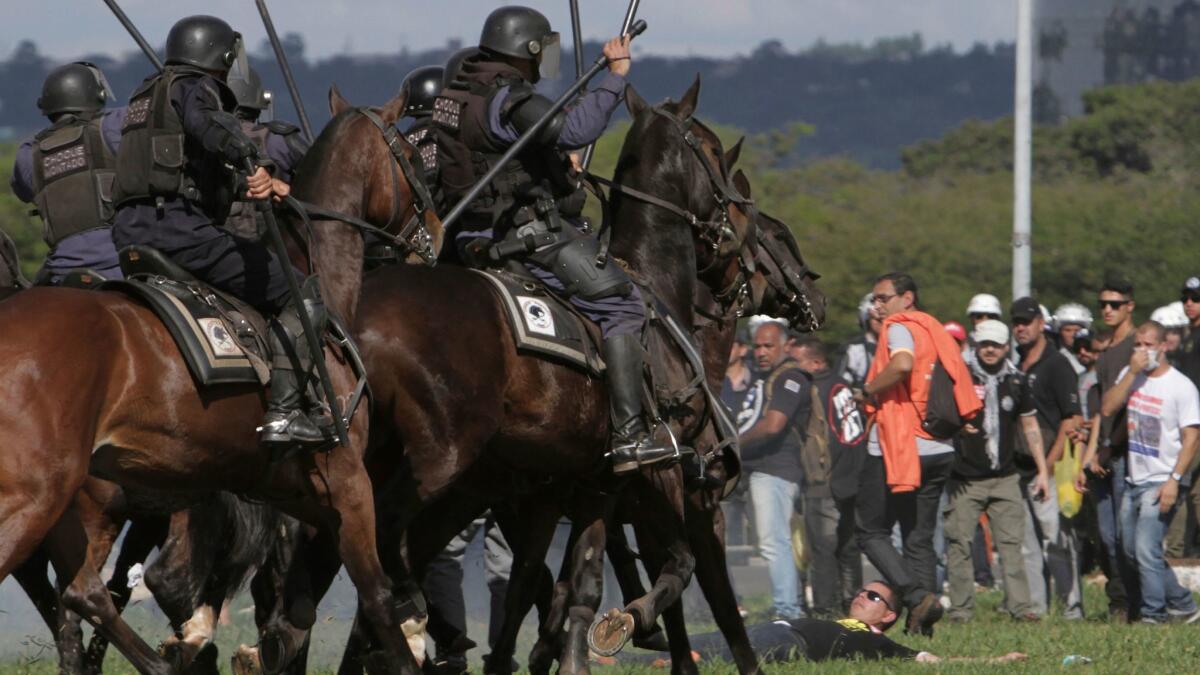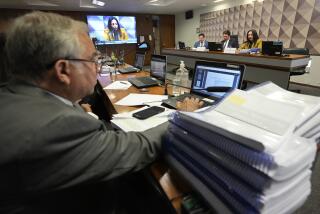Bloodshed, fires and chaos as thousands march in Brazil to demand presidentâs ouster
Reporting from SĂŁo Paulo, BRAZIL â Tens of thousands of Brazilians descended on Brasilia, the capital, on Wednesday, setting fires, smashing windows and storming government buildings to demand the ouster of yet another Brazilian president engulfed in a corruption scandal.
President Michel Temer ordered federal troops to restore order, and black smoke could be seen billowing around the government grounds as protesters ran from police, who were on foot and on horseback.
In television images, an officer could be seen firing an unknown object at a protester sitting on the ground just feet away with his hands in the air. Video circulated on Twitter showed chaotic scenes, with mounted officers advancing on the crowd, which retreats while tear gas canisters fly about.
Officials put the number of protesters at 35,000, and said about 500 buses full of protesters arrived on Wednesday in Brasilia from other states.
A number of ministries were set on fire, leading to evacuations of the buildings. Protesters were also seen smashing windows and lighting tires on fire near Congress, as well as other objects on the government grounds, including bus stops, signs and portable toilets.
âThis mess, this mayhem, is unacceptable,â Defense Minister Raul Jungmann said. âPresident Temer will not allow it.â
The protest, organized by leftist parties and union groups, started off peacefully in the early afternoon in front of the capitalâs soccer stadium. As protesters approached Congress, small confrontations turned into violent clashes. When some protesters tried to jump a cordon, police began to use tear gas, stun grenades and pepper spray to contain the crowd.
Itâs unclear how many were injured, but ambulances arrived on the scene and reports of one person being shot and video of another who lost a hand have circulated.

Jungmann announced that several federal buildings, including the presidential palace, would be guarded under a newly enacted presidential decree.
The decree allows for troops to be used to maintain order, not just on the government grounds but also in a broader capacity in Brasilia. It is set to expire on May 31.
According to a statement from the presidentâs office, âthe decree will be revoked once order is reestablished.â
It also notes that Temer âwould like to emphasize that he will not hesitate to exercise the authority that his position gives him whenever it is necessary.â
The use of armed forces is a choice that could particularly anger the population in Brazil, a country that lived through a military dictatorship from 1964 to 1985. Human rights abuses ran rampant during that time, and many who opposed the government were tortured, jailed and made to disappear.
Temer is struggling to hold on to his post as president after the release of a recording that appears to catch him approving payment of hush money for impeached Lower House speaker Eduardo Cunha, who is serving a 15-year sentence for corruption, money laundering and tax evasion. Temer has also been accused of receiving millions in bribes as part of the expansive corruption scandal known as Lava Jato, or Car Wash.
Since newspaper O Globo reported the existence of the recording â and the Supreme Court allowed its release Friday, Brazilians have taken to the streets across the country to demand that Temer step down. He has refused to do so.
Before the accusations against him came to light, Temer was already an unpopular president, with just a 4% approval rating. He recently celebrated one year in office after taking over for impeached President Dilma Rousseff, who has also been implicated in the corruption scandal through testimony given by billionaire businessman Joesley Batista.
Langlois is a special correspondent.
ALSO
Death toll in Venezuela protest violence rises to 56
Suicide bomberâs father arrested in widening Manchester terrorism investigation
Taiwanâs high court paves the way for same-sex marriage, a first in Asia
More to Read
Sign up for Essential California
The most important California stories and recommendations in your inbox every morning.
You may occasionally receive promotional content from the Los Angeles Times.









